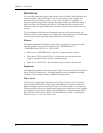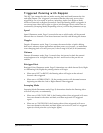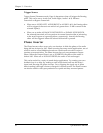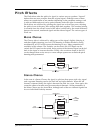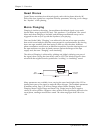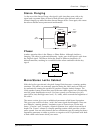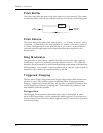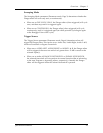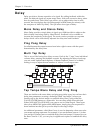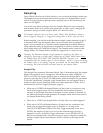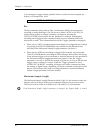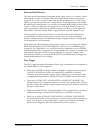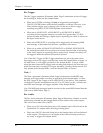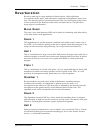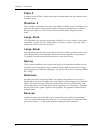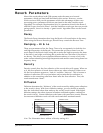
Chapter 3 - Overview
44 Q20 Reference Manual
Delay
Delay provides a discrete repetition of a signal. By adding feedback within the
effect, the delayed signal can repeat many times, with each successive decay softer
than its predecessor. Each Delay type allows you to adjust delay time in milli-
seconds, but also displays the equivalent tempo in BPM (beats per minute), with
the exception of Multi Tap Delay. The Q20 offers four types of delay:
Mono Delay and Stereo Delay
Mono Delay provides a single delay of signal up to 5000.0ms (this is subject to the
limit of delay time being used by other Blocks). Feedback is also available to
increase the complexity of the signal. The stereo version provides two separate
delays which can be individually adjusted for delay time and Feedback.
Ping Pong Delay
So called because the output bounces from left to right in stereo with the speed
determined by the delay time.
Multi Tap Delay
This is sort of like having five delays at once. Each of the 5 ÒtapsÓ have individual
volume, delay, panning and feedback controls. By adjusting the delay of each tap,
you can create sophisticated rhythms. A Master Feedback control is available,
making it easy to adjust the total number of ÒechoesÓ for all taps at once.
Tap 1
Pan
Tap 1
Feedback
Tap 1
Delay
Time
Tap 2
Delay
Time
Tap 3
Delay
Time
Tap 4
Delay
Time
Tap 5
Delay
Time
Master
Feedback
Control
Tap 2
Pan
Tap 2
Feedback
Tap 3
Pan
Tap 3
Feedback
Tap 4
Pan
Tap 4
Feedback
Tap 5
Pan
Tap 5
Feedback
Dry
Signal
L Out
R Out
Tap Tempo Mono Delay and Ping Pong
These are similar to the mono delay and ping pong delay types, but can have their
delay time parameters set using a technique called Òtap tempoÓ (where you
literally tap in the desired tempo to establish delay time), using either the
[VALUE/ENTER] button or a footswitch. You can select which footswitch jack
(either [ADVANCE] or [BYPASS]) you want to use in Global Page 8. These types
also sync to MIDI Clock pulses on the MIDI Inputs, simply plug your sequencer or
drum machine into the Q20 to sync the delays to the songÕs tempo.
An additional parameter, called Beat Count, is used to determine what note value
your tempo tapping represents. For example, if you set the Beat Count to 1/4, then
you can tap in quarter-notes to establish delay time (and tempo). If instead you set
the Beat Count to 1/8T, you can play in eighth-note triplets to establish the delay
time.



